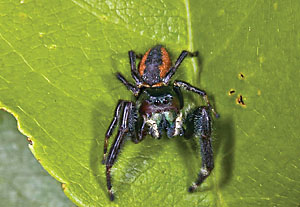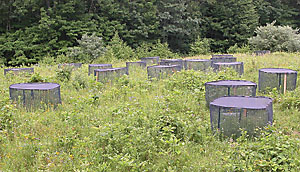 | Because they influence their prey's habits and movements, predators such as this jumping spider have a strong impact on an ecosystem. |
Predators have considerably more influence than plants over how an ecosystem
functions, according to a Yale study that offers a revolutionary shift in thinking
on the subject. In a three-year experiment conducted in 14 enclosed cages at Yale-Myers
Forest in northeastern Connecticut, Schmitz observed that the jumping spider,
known also by its Latin name Phidippus rimator, prowls its neighborhood, or
ecosystem, and engages in random acts of violence against its plant-eating
prey, the garden variety grasshopper, Melanopuls femurrubrum.
T H I S
Yale study offers revolutionary
view of ecosystem ecology
Ecosystem ecologists have long held that plants and their interaction with
the soil determine the type and abundance of herbivores and carnivores in an
ecosystem. The new findings, published Feb. 15 in the journal Science, show
that the opposite it true, according to author Oswald Schmitz, the Oastler
Professor of Population and Community Ecology at the Yale School of Forestry & Environmental
Studies.
“Most ecosystem ecologists think that the supply of nutrients in plants
determines who can live up in higher trophic (feeding) levels,” says Schmitz. “This
study shows that it’s the top trophic levels determining how the plants
interact with the soil.”
Much like victims of crime, grasshoppers facing an imminent threat go into
a heightened state of alert. The grasshoppers take refuge in the ecosystem’s
dominant plant, the goldenrod. With mobility restricted, the grasshoppers dine
on their own shelter and through this process of destruction, promote habitat
diversity. The goldenrod’s competitors — Asters, Queen Anne’s
Lace and a variety of clover and grasses — flourish. Diversity comes
at a price, say the scientists. With the demise of the goldenrod, nitrogen — a
key fertilizer in the soil’s renewal — is depleted.
In a separate part of the experiment, nursery web spiders (Pisaurina mira), which
Schmitz describes as “sit-and-wait ambush spiders” because they are
coy about their predatory intentions, occupy a certain “bad neighborhood,” enabling
grasshoppers to avoid them, roam the ecosystem and eat a wider variety of plants.
In this milieu, the goldenrod thrives, ultimately nourishing the soil when its
nitrogen-rich tissue decays.

These enclosed metal cages were used as part of a three-year study of ecosystem ecology in the Yale-Myers Forest. The scientists — led by Oswald Schmitz of the School of Forestry & Environmental Studies — offered a "top-down" view of ecosystem ecology. While it has long been held that plants have the most influence over how an ecosystem functions, this study suggests it is predators and how they influence the habits of their plant-eating prey.
“What’s really cool here is that different spiders have different
hunting modes, and it’s those modes that cause grasshoppers to behave differently,
which then carries down the chains of the community structure of the plants,” says
Schmitz. “So it’s a top-down view and, in that sense, it’s
revolutionary because it’s a paradigm change in ecosystem ecology. Plants,
ecosystem ecologists say, have an indirect effect on carnivores. My research
shows that carnivores have an indirect effect on plants.”
Schmitz says that the study’s underlying principles apply to larger ecosystems,
such as Yellowstone National Park, and have implications for conservation policies. “If
elk are facing cougars, which are ambush predators, they’re going to change
where they are on the landscape. Whereas when elk face wolves, they may not change
their location; they’ll only respond to an imminent threat, because wolves
are continually wandering around on the prowl.”
He adds, “We know that elk can have a huge impact on plant diversity and,
as a consequence, nutrient cycling properties. And so by the way they use the
landscape, depending on what predator they have, that will change the local ecosystem
processes.”
Funding for the study was provided by the National Science Foundation’s
Ecological Biology program. W E E K ' S
W E E K ' S S T O R I E S
S T O R I E S![]()
 Yale study offers revolutionary view of ecosystem ecology
Yale study offers revolutionary view of ecosystem ecology![]()
![]()
 USA Today honors students for their work ‘beyond the classroom’
USA Today honors students for their work ‘beyond the classroom’![]()
![]()
 Amar and Crothers cited for teaching and scholarship
Amar and Crothers cited for teaching and scholarship![]()
![]()
 Yale expert on elections helped to monitor ‘historic’ vote in
Pakistan
Yale expert on elections helped to monitor ‘historic’ vote in
Pakistan![]()
![]()
 Yale-developed artificial cell helps immune system fight cancer
Yale-developed artificial cell helps immune system fight cancer![]()
![]()
 Divinity School professor to head Union Theological Seminary
Divinity School professor to head Union Theological Seminary![]()
![]()
 Lavik lauded for innovation, leadership
Lavik lauded for innovation, leadership![]()
![]()
 Liman Colloquium to examine public interest advocacy . . .
Liman Colloquium to examine public interest advocacy . . .![]()
![]()
 Library staff wins Noah Webster Award for . . .
Library staff wins Noah Webster Award for . . .![]()
![]()
 Campus Notes
Campus Notes![]()
Bulletin Home |
| Visiting on Campus
Visiting on Campus |
| Calendar of Events
Calendar of Events |
| In the News
In the News![]()
Bulletin Board |
| Classified Ads
Classified Ads |
| Search Archives
Search Archives |
| Deadlines
Deadlines![]()
Bulletin Staff |
| Public Affairs
Public Affairs |
| News Releases
News Releases |
| E-Mail Us
E-Mail Us |
| Yale Home
Yale Home